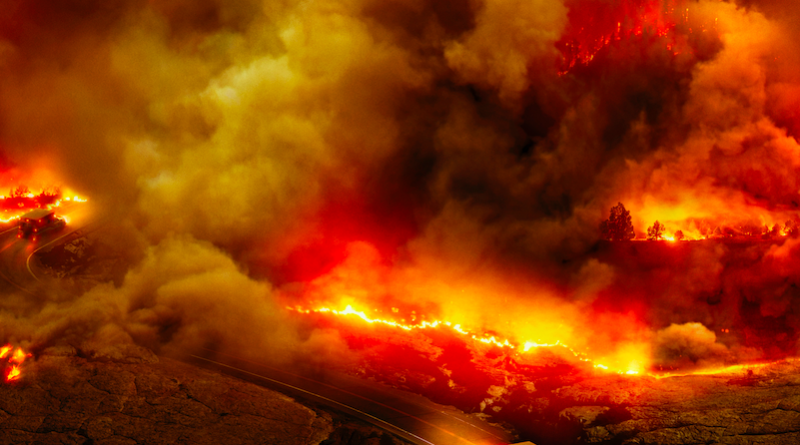REVIEW: ‘Bring Your Own Brigade’ documents the perils of wildfires
Photo: Bring Your Own Brigade is a new documentary by Lucy Walker about California’s wildfires. Photo courtesy of Topic Studios / Provided by press rep with permission.
Bring Your Own Brigade, the new documentary from Paramount+ and CBS News, is perhaps the scariest and timeliest film of the year. Lucy Walker’s exposé of the Camp Fire in 2018, which proved to be the deadliest and most destructive wildfire in California’s history, is a harrowing experience to view, especially the first hour. After the flames subside, the reality sets in, and Walker shifts her thesis to see how wildfires have changed California and the world, and how communities and individuals can modify their practices to help the future.
One of the opening images of Bring Your Own Brigade is perhaps the most startling image throughout the entire two-hour documentary. Viewers beware. Rather than starting in California, which is her narrative focus, Walker includes footage of a badly burned koala bear who has been injured during an Australian wildfire. It’s an uncomfortable 30 seconds, but sets the scene: This is serious business.
The first half of the documentary is an exploration of the Camp Fire in northern California and another conflagration near Malibu in the southern portion of the state. Much of the footage is pulled from smartphone devices of survivors looking for a viable evacuation route. Soon enough, the story focuses on one community: the aptly and ironically named Paradise, California, which found itself in the cross-hairs of the Camp Fire. The visuals are stunning and hellish, reminding viewers of an apocalyptic future out of a Terminator film or an Iron Maiden music video. The trees are ablaze. Houses are destroyed. Embers freely float through the air, while explosions rock the landscape. Residents take to their vehicles and try to descend the main road from this mountain town, but they are met with traffic and stalled-out vehicles that block their way. Many make it out to the sanctuary of a Walgreen’s store being protected by firefighters, while others are stuck in the flames and perish.
One family in Walker’s story receives the most focus. There’s an older widower who cannot get out of the town in time, mostly because he has his elderly mother to protect. His mother, who is blind, lives in a bed and welcomes visitors with a warm smile and big hug; for her, transport down the mountain would not have been easy. Thankfully they survive, living another day to tell others about their ordeal. They also become an island of refuge for neighbors who lost their homes; this man and his mother open up their property to campers and allow whomever needs help to move in.
Others in the community are also documented, including the brave firefighters who fought the flames, the town’s elected representatives, local residents, and experts on wildfires and climate change. The stories are difficult, but important to hear. A new mother needs to shield her infant child from the flames. A husband leaves a voicemail for his family that he tried to get out but was unsuccessful. Locals who see their possessions burn up in seconds. There are also scenes from Malibu with firefighters and homeowners facing their own seemingly unstoppable blaze.
Moving beyond the flames, Walker then focuses on the aftermath — politically, environmentally and socially. She questions the residents about their views on climate change, and she’s surprised to find that some residents of Paradise don’t believe the wildfire has any connection to climate change, mostly because they don’t believe in the merits of the scientific argument.
She also showcases the sad reality of the changing world: High-income families can now fight wildfires by hiring private firefighters (Kim Kardashian is included in one clip when she shares this luxury of hers on Ellen), while lower-income families must face the flames without as much financial security. Other scenes follow the political turmoil after the historic fires, when Malibu residents criticize the response to the conflagration, and Paradise residents consider building code changes to prevent another fire from destroying the town once again.
Build Your Own Brigade is an example of necessary documentary evidence of the growing threat of wildfires and climate change. Some films have looked at Atlantic Ocean hurricanes, while others haver looked at environmental degradation in different parts of the world. It’s crucial to have a set-aside documentary about wildfires because these blazes speak to the drought conditions of the American West, the history of the lumber industry, the decisions of homeowners and towns, and the political forces at play. The Camp Fire was destructive and unprecedented, and this full-on examination allows viewers the chance to see what went wrong and — hopefully — what can be changed for the future.
By John Soltes / Publisher / John@HollywoodSoapbox.com
Bring Your Own Brigade (2021). Directed by Lucy Walker. Running time: 119 minutes. Rated R for language. Now streaming on Paramount+. Rating: 


 Click here for more information.
Click here for more information.

